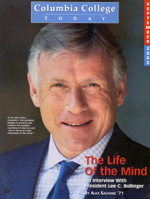 |
 |
 |
 |
|
AROUND THE
QUADS Joel Klein '67 Named NYC Schools Chancellor By Lisa Palladino
Joel Klein ’67, a former assistant attorney journal who led the antitrust case against Microsoft, has been appointed New York City’s schools chancellor by Mayor Michael Bloomberg, placing him at the helm of the nation’s largest school system. Klein, 55, who most recently served as chairman and CEO of the media company Bertelsmann Inc., was honored by the College last spring with a John Jay Award for Distinguished Professional Achievement. In his new job, Klein will oversee a $12 billion school system with 1.1 million students, 70,000 teachers and 1,204 schools. As a result of state legislation passed in June that shifted control of the city’s schools from the former Board of Education to the mayor’s office, Klein will have unprecedented power as chancellor to run the system, appointing district superintendents and directing the 32 community school districts as he and the mayor see fit. The Board of Education has been replaced by an advisory Panel for Educational Policy, with the mayor picking eight of its 13 members and the new chancellor serving as chair. The selection of Klein, who was in charge of the Justice Department’s 700-lawyer antitrust division for President Bill Clinton from 1997–2001, surprised many because of his lack of a background in education, but delighted others who think the city’s school system will benefit from a business-style cleanup and reorganization. In announcing his choice, Bloomberg said, “We need somebody with intelligence, we need somebody who is innovative, we need somebody with impeccable integrity, we need somebody with management skills, we need somebody with scholarship.” A native New Yorker, Klein spoke passionately about the education he received in the city’s public schools. “I owe those teachers, and this city school system, more than I can ever repay. I am a product of these schools (Klein attended P.S. 205 in Bensonhurst, Brooklyn, and graduated from William C. Bryant High School in Long Island City, Queens), and I love what my public education did for me. I pledge to do all that I can to give each child in the City of New York a first-rate education and the keys to unlock what this magnificent world has to offer.” Klein described his education at Columbia as a “rebirth” during his acceptance speech of the John Jay Award on March 6, saying, “Columbia instilled in me an array of values that I consider to be my core, and for that I am grateful beyond measure.” Klein also said that Columbia professors instilled in him the belief that “there is no higher calling than public service, and I am so fortunate to have had that opportunity. In this great nation, for all its flaws, a person’s opportunities are truly limitless, and the obligation to give back is absolutely critical.” Klein’s father was a postal worker, his mother a bookkeeper. After graduating from the College, Klein earned his law degree from Harvard in 1971. He has no formal experience in public education, save for a brief stint teaching math to sixth graders at a public school in Long Island City during a leave of absence from law school in 1969. During that time, Klein studied at NYU’s School of Education, and soon thereafter was called up by the Army Reserve. In the early 1970s, Klein served as a law clerk for David Bazelon, the chief judge of the United States Court of Appeals for the District of Columbia Circuit, and for Justice Lewis Powell of the United States Supreme Court. During the 1970s, Klein held several law-related positions in the Washington, D.C., area. During 1981–93, Klein practiced with Onek Klein & Farr — of which he is a founder, and which later changed to Klein, Farr, Smith & Taranto — and specialized in complex trial and appellate litigation. During his time in Washington, D.C., Klein argued 11 cases before the Supreme Court, winning nine of them. He also was a visiting and adjunct professor at Georgetown’s Law Center in 1987. Klein came to President Clinton’s attention at Renaissance Weekends, a retreat for Democratic baby boomers, and joined the Clinton White House in 1993, early in the administration, succeeding Vincent W. Foster Jr. as deputy White House counsel. Klein moved to the Justice Department in 1995 as principal deputy to the assistant attorney general; was appointed acting assistant attorney general in October 1996 after serving as the antitrust division’s principal deputy and deputy counsel to President Clinton; and was made the nation’s top antitrust official in 1997. During Klein’s tenure with the Justice Department, the government blocked or altered about 170 mergers. In 220 criminal price-fixing cases, 52 executives were sent to prison, corporations paid $1.7 billion in fines and individuals paid another $21 million. Klein led the charge against Microsoft, WorldCom/Sprint, Visa/MasterCard, American Airlines and General Electric. His specialty was trying to break up monopolies that distorted the marketplace. In 2000, Klein began criminal antitrust prosecution of more than a dozen food companies accused of rigging bids on contracts for $210 million of frozen food and fresh produce sold to the New York City Board of Education. The companies pleaded guilty or were convicted. Klein joined Bertelsmann Inc., an American part of German-based Bertelsmann AG, one of the largest media conglomerates in the world, in January 2001. Klein, who lives in Manhattan, is married to Nicole Seligman,
executive vice president and general counsel of Sony Corporation of
America. Seligman, formerly a partner in the Washington, D.C., law
firm of Williams & Connolly, represented President Clinton
during the impeachment proceedings. Klein has an adult
stepdaughter, Harriet, from his second wife’s previous
marriage and an adopted teenage daughter, Julia, also from that
marriage. |
|
||||||||||||||||||||||||||||||||||||||||||||||||||

